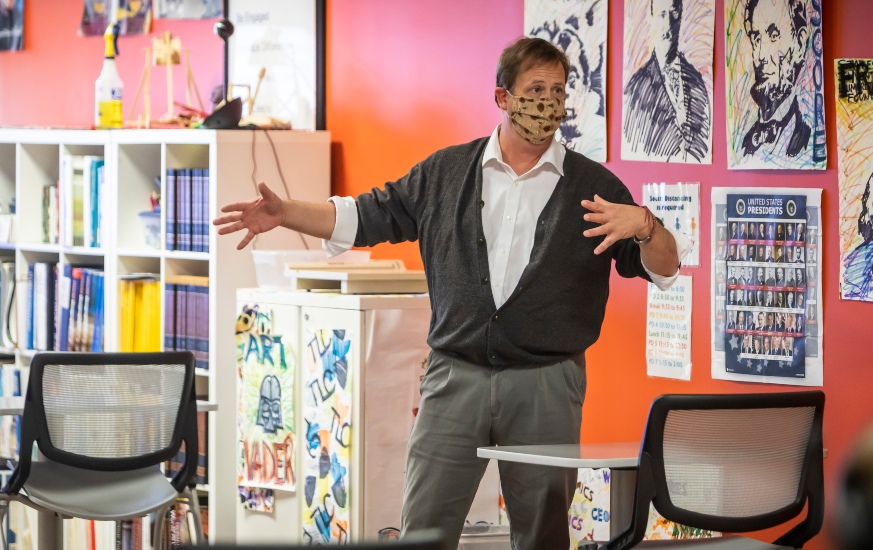
This article was originally published on June 29, 2021 by MontcoToday.
By David Bjorkgren
Todd Fegley has been teaching high schoolers social studies and art for nearly a decade at the TLC Leadership Academy.
Though teaching at an alternative education school that provides social, emotional, and mental health support isn’t something he foresaw while in college, “At this point, I’ve been doing this kind of stuff for so long I don’t know if I’d want to teach at a public school or if I’d find it enjoyable,” Fegley says.
His background
Fegley graduated college in 1993 with an art degree and spent 12 years in the commercial print business. One day, a boss suggested he’d make a good teacher.
That idea took hold and led him in 2007 to the Community Service Foundation at Buxmont Academy. And from there, The Lincoln Center.
The Students
Ninety percent of Leadership Academy students are special education. The school averages 40 students, with six to eight students to a class.
“We’ll have anxiety, depression,” Fegley says. “We’ve had students dealing with the death of a parent, struggling with those kinds of issues.”
This is the school students will come to when other educational institutions don’t have enough resources to help them.
The Staff
At Leadership Academy, education walks hand in hand with counseling and therapy.
“You set up things for our students differently than the way you might in a traditional public school,” Fegley says.
Counselors at the academy provide group counseling, individual counseling, and work closely with teachers to form a support team for each student.
“Sometimes it’s just a matter of the extra support to help them,” he says. Bringing stable people into their lives can make a huge difference. After time, students realize they can rely on their team to help them overcome problems and approach obstacles.
Knowing what support to give students while still encouraging growth and accountability is key to long-term progress.
“We’re going to support you but we’re going to hold you accountable so you can become that person who can be on their own.”
Techniques
Unlike more crowded public schools, Leadership Academy teachers are better positioned to respond to an individual student’s needs with flexible approaches.
A student having a bad moment can break away for 10 minutes and listen to music.
Students who have test anxiety can use alternate ways to demonstrate their knowledge.
Teachers tap into their relationships with students to learn what motivates each learner, and this is possible because of small class sizes.
Fegley doesn’t stand up in front and teach to rows of students. Instead, there are clusters of desks, and though Fegley may get conversations going, he is often surprised when students explore new topics of discussion, sometimes accidently leading into the next unit of study.
Outcomes
Being in a school with only 40 or so kids means you get to know everybody.
“You get to build relationships with them,” Fegley says. “You know what they’re struggling with.
“You know you can intercede to help them.”
Fegley is always pleased when he runs into former students years later and finds out how well they’re doing.
Many have gone to college and gotten degrees. One of his students just graduated West Chester University and is working on her master’s degree.
“Everyone I get to graduate that somebody has already said was a waste, that they’re not going to graduate; every one of those kids that graduate I just put a little notch in my belt.”
Click here to learn more about The Lincoln Center and its program.
